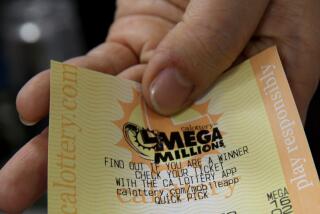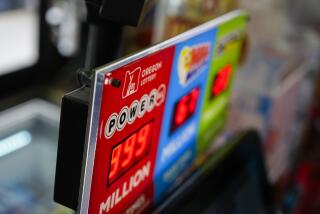Connecticut Plays on Mutual Funds
- Share via
If imitation is the sincerest form of flattery, mutual funds have just been paid a generous compliment by the Connecticut Lottery.
In late September, that enterprise launched a game called Mutual Fun$, in which the price of a $5 ticket buys you a chance to “win up to 15 times!”
The Mutual Fun$ game ticket has separate scratch-off sections headed “winning portfolio,” “winning stocks,” and “extra dividend.” Prizes are offered in amounts ranging from $5 to $100,000, with the average chance of collecting something listed as one in 4.04, or slightly less than 25%.
This just goes to show you how famous mutual funds have become. It also provides a nicely contrasting demonstration of the different ways people can choose to try to turn their money into something of greater value.
Hit the big prize in Mutual Fun$, and you get a fast 20,000% return on your investment (ignoring taxes and other real-world details). That far outstrips the best you can hope for from any mutual fund. Even in an exceptional bull market on Wall Street, it’s a rare feat to turn $5 invested in a stock mutual fund into $7.50 in a year’s time.
In the more conservative vehicle known as money market mutual funds, which currently return about 5% annually, you can expect $5 to become about $5.25 a year from now.
But, of course, possible payoffs are only one of the variables to be considered. A Mutual Fun$ game ticket’s mathematical chance of paying the big prize is about one in a million. Three out of every four times, the sure return is minus 100%.
In a mutual fund, by contrast, the prospects for achieving a positive return range from good to almost certain, depending on the type of fund you buy, how long you hold your investment, and other things like that.
Maybe the most important idea of all to grasp is that mutual funds are usually “positive-sum” deals, creating wealth that makes it possible for all or most players to win at the same time. Lotteries, by contrast, are a “negative sum” proposition.
After money has been taken out to cover expenses and pay the state its cut, the Connecticut Lottery Corp. says 70 percent of the money spent on Mutual Fun$ tickets stays in the prize pool. That’s a bigger share than in many lottery games, where the so-called payback rate may be as low as 40% to 50%.
Even so, it means that all Mutual Fun$ players collectively can expect, on average, to turn every $5 they put up into $3.50.
Connecticut Lottery officials, to their credit, say they have no intention of trying to market Mutual Fun$ or any of their other products as anything other than a game. “They’re not trying to take away from people trying to invest their money properly,” says Laura Gibbs, a spokeswoman for the corporation that runs the lottery.
“Even though the odds against winning are large,” writes Bill Adler Jr. in his The Lottery Book, “playing the lottery is fun.”
But no player of lottery games should overlook all the costs, including lost opportunity, of letting the hope of instant gratification attract you to something like Mutual Fun$ instead of mutual funds.
Say you’re in the habit of spending $20 a week on lottery tickets. If you save that money instead for investment in mutual funds, you will accumulate more than $1,000 within a year.
A thousand bucks invested in a money fund at current market yields would pay you a “prize” of $50 every year, without the need for luck. Put the cash in a stock, bond or combination mutual fund, and you could hope for an even bigger payoff.
No, it wouldn’t be a sure thing. But it would represent a realistic expectation, not the pie-in-the-sky improbability that a lottery ticket represents.
It’s an oddity of modern life, by the way, that a sound deal like mutual funds sometimes has to operate in a less friendly regulatory climate than a state lottery. Imagine, for instance, what the Securities and Exchange Commission would say if a mutual fund company tried to introduce a product called Lottery Ticket$.
More to Read
Inside the business of entertainment
The Wide Shot brings you news, analysis and insights on everything from streaming wars to production — and what it all means for the future.
You may occasionally receive promotional content from the Los Angeles Times.










